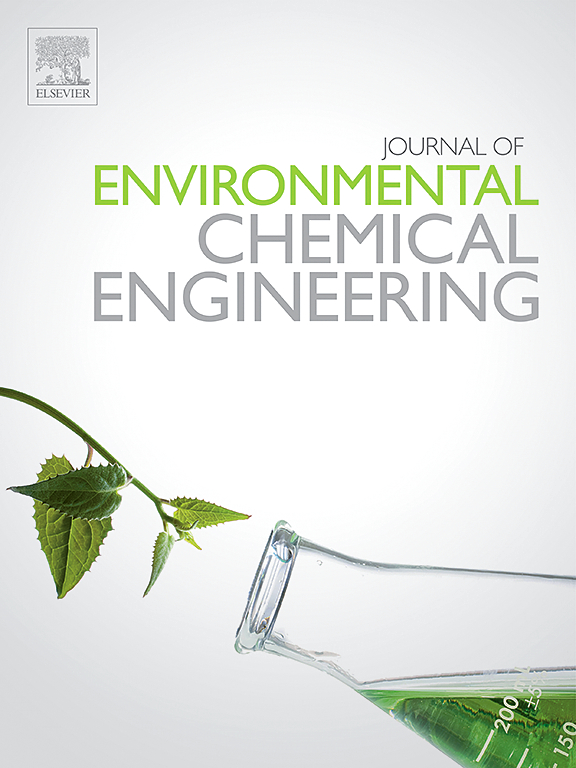Biofiltration for low-carbon rural wastewater treatment: A review of advancements and opportunities towards carbon neutrality
IF 7.4
2区 工程技术
Q1 ENGINEERING, CHEMICAL
引用次数: 0
Abstract
Recently, with an increasing recognition of the global imperative for carbon neutrality, underscoring the significance of advanced sustainable and low-carbon biotechnologies for rural wastewater treatment is becoming more important. The decentralized distribution of rural wastewater, which frequently cannot be centrally processed, coupled with fluctuations in water quality and volume, present challenges for implementing low-carbon treatment strategies. Among all treatment processes of rural wastewater, biofiltration system is considered as a suitable and low-carbon treatment process. In this study, benefits and advancements of implementing biofiltration process and its derivatives as good alternatives to the low-carbon treatment of rural wastewater towards carbon neutrality. Challenges of rural wastewater treatment and limitations of existing biological treatment processes were investigated. Advanced biofiltration technologies integrated with the concept of carbon neutrality present advantages such as promoted removal performance of pollutants, energy conservation, lower operational expenses, and minimal greenhouse gas emissions were recommended. These systems have the potential for extension and modification to accommodate various circumstances. Newly developed biotechnologies for the enhancements of biofiltration process include combinations like improvements on filter media, exogenous additives for enhanced removal, integration with carbon-neutral processes for effective nitrogen and phosphorus removal like sulfur-based autotrophic denitrification, pyrite-based autotrophic denitrification and anaerobic ammonium oxidation process with its upgrades and derivatives. In the future, developments in biofiltration process can be pursued through various avenues for the aim of achieving low-carbon treatment of pollutants from rural wastewater. This study offers a novel perspective on the utilization of biofiltration and popularize the carbon-neutral treatment of rural wastewater.
生物滤池用于低碳农村污水处理:回顾实现碳中和的进展和机遇
最近,随着全球日益认识到碳中和的必要性,强调先进的可持续低碳生物技术对农村污水处理的重要性变得越来越重要。农村废水分布分散,往往无法集中处理,再加上水质和水量的波动,给实施低碳处理战略带来了挑战。在所有农村污水处理工艺中,生物过滤系统被认为是一种合适的低碳处理工艺。在本研究中,生物过滤工艺及其衍生物作为农村废水低碳处理的良好替代品,在实现碳中和方面的益处和进展。研究还调查了农村废水处理所面临的挑战和现有生物处理工艺的局限性。建议采用与碳中和概念相结合的先进生物过滤技术,这些技术具有提高污染物去除率、节约能源、降低运营成本和减少温室气体排放等优点。这些系统具有扩展和修改的潜力,以适应各种情况。为改进生物过滤工艺而新开发的生物技术包括各种组合,如改进过滤介质、添加外源添加剂以增强去除效果、与碳中性工艺相结合以有效去除氮和磷,如基于硫的自养反硝化、基于黄铁矿的自养反硝化和厌氧氨氧化工艺及其升级和衍生物。今后,可通过各种途径发展生物过滤工艺,以实现低碳处理农村污水中的污染物。本研究为生物过滤的利用提供了一个新的视角,并推广了农村废水的碳中和处理。
本文章由计算机程序翻译,如有差异,请以英文原文为准。
求助全文
约1分钟内获得全文
求助全文
来源期刊

Journal of Environmental Chemical Engineering
Environmental Science-Pollution
CiteScore
11.40
自引率
6.50%
发文量
2017
审稿时长
27 days
期刊介绍:
The Journal of Environmental Chemical Engineering (JECE) serves as a platform for the dissemination of original and innovative research focusing on the advancement of environmentally-friendly, sustainable technologies. JECE emphasizes the transition towards a carbon-neutral circular economy and a self-sufficient bio-based economy. Topics covered include soil, water, wastewater, and air decontamination; pollution monitoring, prevention, and control; advanced analytics, sensors, impact and risk assessment methodologies in environmental chemical engineering; resource recovery (water, nutrients, materials, energy); industrial ecology; valorization of waste streams; waste management (including e-waste); climate-water-energy-food nexus; novel materials for environmental, chemical, and energy applications; sustainability and environmental safety; water digitalization, water data science, and machine learning; process integration and intensification; recent developments in green chemistry for synthesis, catalysis, and energy; and original research on contaminants of emerging concern, persistent chemicals, and priority substances, including microplastics, nanoplastics, nanomaterials, micropollutants, antimicrobial resistance genes, and emerging pathogens (viruses, bacteria, parasites) of environmental significance.
 求助内容:
求助内容: 应助结果提醒方式:
应助结果提醒方式:


